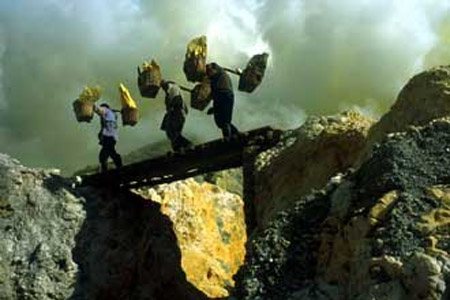Editor’s note: We republish this 2012 feature to remember Michael Glawogger, who, we learned yesterday, died while filming in Africa. In the decades following World War II, the artful photography and careful construction that had defined documentary were supplanted by more visceral depictions of reality. Lightweight, portable cameras allowed filmmakers to be in the middle of the action, and audiences came to see handheld camerawork as the very manifestation of truth. Jagged, fragmented editing, mimicking the chaos of the times, added to the sense of immediacy.The genre was energized, for a while, but the fresh, new grammar was inevitably copied and cannibalized by TV commercials and calcified into a cliché ripe for parody in mockumentaries. (Consider that it’s more than a quarter of a century since This Is Spinal Tap came out in 1984, and David Holzman’s Diary was made seventeen years earlier.) The documentary needed to break through to another level, and European filmmakers such as Werner Herzog (yes, we realize he gets credit for too much already), Heddy Honigmann and Michael Glawogger were pioneers in reintroducing art and redefining the form for an ever-increasing chunk of the audience.Glawogger, an Austrian who studied in Vienna and San Francisco, achieved international prominence with Megacities (1998), an ambitious, elegantly shot snapshot of tenuous life on the cusp of the millennium in the tense, teeming metropolises of Bombay, Mexico City, Moscow and New York. Experiential rather than educational, this sobering film employed a strong, bold aesthetic but provided few facts and no moral. For moviegoers used to sifting and weighing meaning from nonfiction, Megacities was an odd, disorienting experience.“Here in the United States, the documentary filmmaker is often mistaken for being a journalist,” Glawogger observed on a recent Skype call from New York coinciding with the April 27 [2012] theatrical premiere of his latest doc, Whores’ Glory. “And I have nothing to do whatsoever with being a journalist and with revealing things.”
‘I look out for situations and places where I can show and learn something about the human condition … and about the human soul. I’m neither a social nor a political filmmaker. My films do have social connotations and political impact, but I’m not what you would call an activist filmmaker. I think activists should be activists and filmmakers should be filmmakers.’
To take it a step further, mainstream audiences have started to catch on that the once-exalted notion of the objective, distanced documentary filmmaker is an illusion. Every doc has a point of view (which isn’t the same thing as saying that every film is biased, or inaccurate, or untrustworthy). It’s a fact of nature, and Glawogger is both bemused and frustrated that there’s still some resistance to it.“I think here [in the U.S.] there’s this notion that there’s an outside reality or a kind of objective reality that you are investigating,” Glawogger asserts. “I totally disagree with that. There is no reality out there that you’re supposed to reflect. There is only a reality out there that you pass on through your eyes.”The risk with Glawogger’s approach to filmmaking, which doesn’t traffic in analysis or conclusions, is that viewers will interpret what they see in ways he didn’t intend. Let’s just say he trusts his audience to an unusual degree.“Of course I have to, like every artist [does],” he says with a chuckle. “I mean, you’re only one possible vision of heaven, hell and the world through the camera, so everyone standing in front of these paintings will look at this in a different way. I have no intention to control my audience and tell them what to think. I’m offering an image of the world, maybe one that they haven’t seen at any moment in their lives and otherwise probably wouldn’t see, and by offering that I want to trigger thoughts. But I don’t want to control those thoughts.”He adds with a chuckle, “Of course, there is room for misinterpretation, but if you work that way you have to endure it. And if you’re misinterpreted, then yeah, it’s your own canvas, that’s the way you did it.”Glawogger won a new crop of converts with Workingman’s Death (2005), a gorgeously photographed, five-part survey of manual labor in the globalized economy (which many First Worlders, remember, think is an “information economy”) that thrust us into the workday routines of Indonesian sulfur harvesters, outdoor butchers in Nigeria, Ukrainian coal miners, ship “recyclers” in Pakistan and steelworkers in China. To an even greater degree than he did in Megacities, Glawogger eschewed quick-cut, shakycam reportage for long, fluid, beautifully composed shots. Once again, viewers were left to their own readings and their own conclusions.“I consider myself an artistic filmmaker,” Glawogger declared. “I look out for situations and places where I can show and learn something about the human condition … and about the human soul. I’m neither a social nor a political filmmaker. My films do have social connotations and political impact, but I’m not what you would call an activist filmmaker. I think activists should be activists and filmmakers should be filmmakers.”
By now we know what to expect, or what not to expect, from Whores’ Glory, the final chapter in Glawogger’s trilogy about the difficult and deeply humbling necessity of working for a living. He visits three foreign and far-flung locations—a glitzy Bangkok brothel called the Fishtank, a far-less-structured, maze-like enclave called the City of Joy (which it might be for the johns but not for the girls) in Faridpur, Bangladesh and La Zona (The Zone), an undeveloped strip on the outskirts of Reynosa, Mexico that men cruise in their pickup trucks.“When I come to a place like that, I first have to find out what it’s all about,” Glawogger explains. “How does it work? Where are the mothers, how are the pimps, the rules, the structure, how is the everyday life. I feel and explore myself into this world that is happening. I’m mainly observational about it because what I don’t see I cannot film and what I cannot film I should shut up about. So I’m more or less looking for locations that are very talkative themselves. Bangladesh is almost like this labyrinth of stories and of lives, and with every door something new opens, and I’m really more after the observation of the everyday life than the structure behind it or the question of why this life works like that. I just want to explore it, how I feel it and how I encounter it.”Glawogger’s documentaries may not have a message, per se, but at the same time they’re not dispassionate cinema verité. For example, the filmmaker uses a lot of Western music on the Whores’ Glory soundtrack, which could be taken as an editorial comment on the relationship between the First World and the Third World. Glawogger dismisses the suggestion.“Artistic choices come out of the reality I’m dealing with and how I see this reality,” he explains. “So the prostitution in its everyday appearance is mostly about waiting. More about waiting than about sex. These girls listen to a lot of music, and while I’m with them and researching the film and finding out how they’re doing it, I listen to a lot of music, too. So in all those moments when filmmakers and the people the film is about come together, two worlds collide in a way, and also in terms of the musical choices. When I showed the film, especially to the Mexican girls, they loved the music, they’d never heard it before. It’s some kind of a dialogue that I consider to be interesting.”
‘Artistic choices come out of the reality I’m dealing with and how I see this reality,’ Glawogger explains. ‘So the prostitution in its everyday appearance is mostly about waiting. More about waiting than about sex. These girls listen to a lot of music, and while I’m with them and researching the film and finding out how they’re doing it, I listen to a lot of music, too. So in all those moments when filmmakers and the people the film is about come together, two worlds collide in a way.’
Whores’ Glory has occasioned a retrospective in New York as well as at Berkeley’s Pacific Film Archive, where Glawogger will appear on stage with critic Dennis Lim May 4-6 and expound with his usual unapologetic candor before screenings of the trilogy plus his 2009 narrative feature, Kill Daddy Good Night. Glawogger’s documentaries are so original and startling that his fiction work, especially the savage 2006 comedy Slumming, tends to get underrated.“In Workingman’s Death, you see a slaughterhouse in Nigeria and at the same time it’s pretty gross but it’s also very beautiful,” he muses. “As a human being and as a person who sits in the movie theater, you think to yourself, ‘How can this be so beautiful?’ In Kill Daddy Good Night, you have this setup where a guy finds an outright [unrepentant] Nazi, but he likes the guy. And he asks himself, ‘How can I like this guy?’ These kind of moments, when we are repelled in life, are the moments that drive me, are the moments when I want to make a film, and then it’s sort of not that important if it’s fiction or nonfiction.”We can count on Glawogger to collect a slew of repellent, contradictory and mystifying moments for his next nonfiction project, which he’s tentatively calling “A Film Without a Name.”“I try to free myself of theme and issue, which I think is an enemy of documentary filmmaking,” he confides. “So I will travel the world for one year without knowing what I’m looking for and just putting things on the screen that I encounter. So I only let myself be guided by intuition.”What would you have done, I asked, if you had not become a filmmaker? “I don’t know,” he replied. “Maybe I would have become a psychiatrist.” Hmm, then you would have toured and explored a different kind of landscape, yes?“Yeah. But in a way it’s also not too dissimilar to the work you do as a documentary filmmaker. You connect on a level with people where they open up to you, or you are challenged to make them open up to you. And maybe the difference between those two jobs would be that as a filmmaker I also have to open up to them. Which maybe as a psychiatrist I wouldn’t have to do. “





